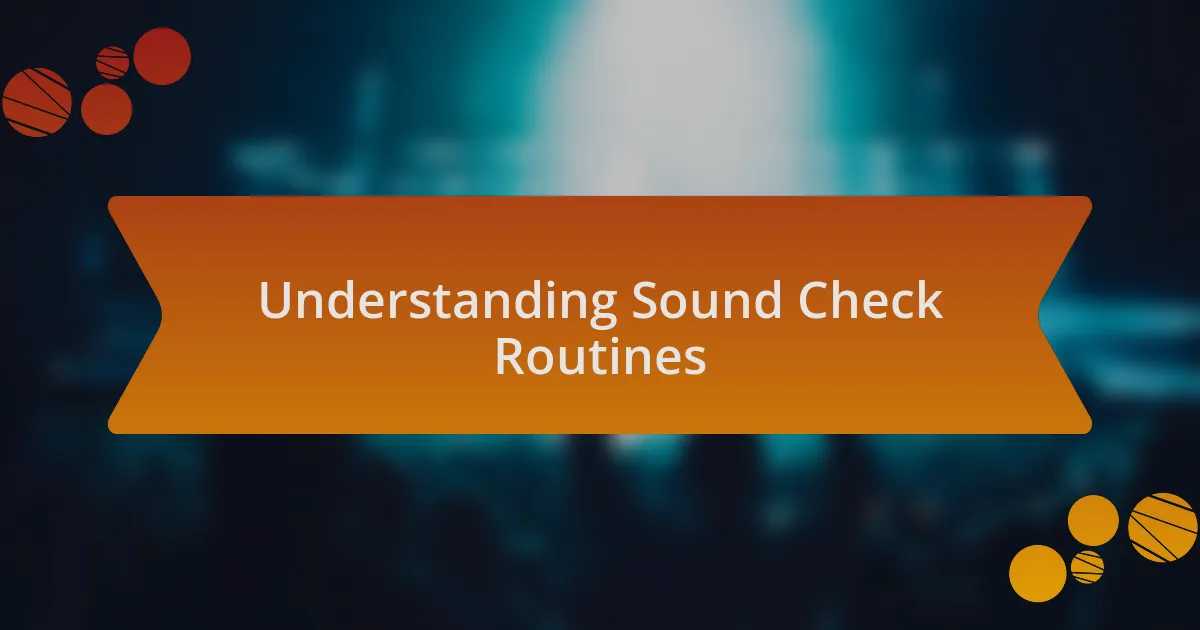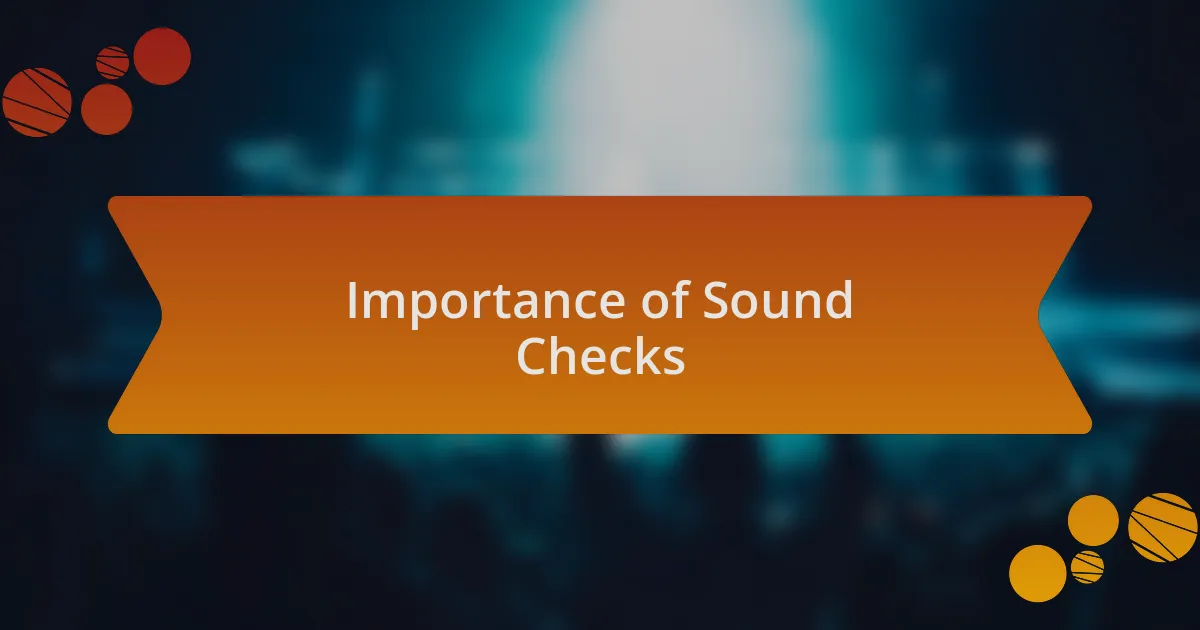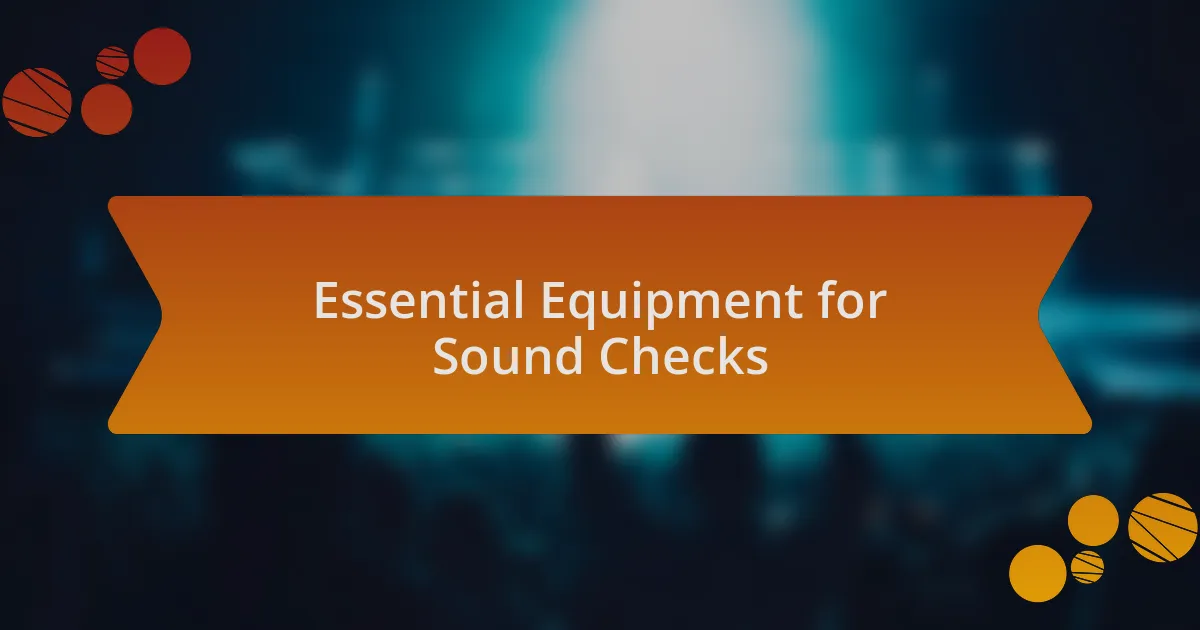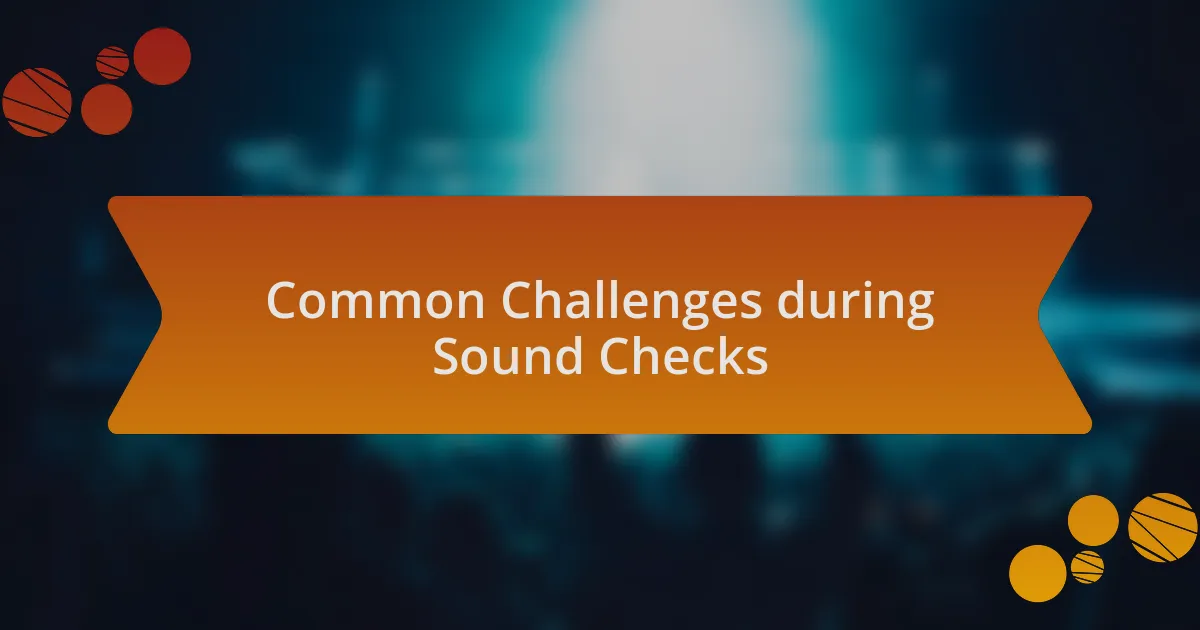Key takeaways:
- Sound check routines are essential for creating an immersive and energetic music experience, with attention to details like microphone placement and speaker alignment.
- Proper sound checks prevent common issues, such as unbalanced sound and feedback, ensuring every performance reaches its full potential.
- Effective communication and time management during sound checks are crucial for addressing challenges and ensuring a successful performance.
- Using the right equipment, including sound mixers, microphones, and monitors, significantly impacts the overall sound quality and audience engagement.

Understanding Sound Check Routines
Sound check routines are critical in ensuring that the music experience is flawlessly vibrant. I remember one particular night when the bass just didn’t feel right during rehearsal. I thought, “How can we create energy without that rich low-end?” That moment underscored the importance of tuning each element to create an immersive atmosphere, one that keeps the crowd dancing all night.
During a sound check, every detail matters—from microphone placement to speaker alignment. I’ve seen sound engineers become almost like artists, making subtle adjustments that can transform a track. It’s fascinating how the tiniest tweak can enhance clarity or impact, elevating the entire performance.
There’s an emotional connection to music that often goes unnoticed until something isn’t quite right. Have you ever felt the vibe drop when the sound isn’t balanced? I certainly have. That’s why sound checks are not just technical; they’re an essential part of creating a shared experience that resonates deeply with the audience and the performers.

Importance of Sound Checks
Sound checks are vital for setting the stage for a memorable night. I recall a time when the lead singer’s vocals were drowned out by the instruments, turning what should have been an exhilarating moment into confusion. Imagine standing in the crowd, eager to sing along, but the lyrics are lost in a shuffle of sound! This experience highlighted how sound checks help avoid these pitfalls, ensuring every note shines through.
Consider the depth a well-timed sound check adds to an event. Without it, a party can quickly become a monotonous background noise. I remember adjusting the acoustic settings at a local venue, and the moment the adjustments kicked in, I could see the crowd perk up. It was incredible how the right balance could transform the energy in the room, allowing the audience to connect with the music on a whole new level.
Moreover, every sound check is an opportunity to anticipate potential issues. Just last month, I observed a sound engineer test the equipment meticulously, diving into each channel one by one. When unforeseen feedback started piercing through the mix, it could’ve thwarted the night. But thanks to the thorough checks, the problem was tackled promptly. How many moments of joy have been saved simply by taking the time for that initial assessment? It’s a small investment for an unforgettable experience.

Essential Equipment for Sound Checks
When it comes to essential equipment for sound checks, a sound mixer is arguably the backbone of any setup. I remember the first time I got my hands on a high-quality digital mixer; it felt empowering to control each sound element precisely. Understanding how to tweak settings for vocals, bass, and treble changed my perspective on what it means to shape an auditory experience. Have you ever noticed how a simple adjustment can make a song feel entirely different? It’s that connection that makes the mixer so indispensable.
Microphones also play a crucial role in this process. I once used a variety of mics during a sound check, from dynamic to condenser models, and each brought its own character to the sound. The dynamic mic picked up the energy of the vocalist perfectly, while a condenser mic captured nuances in quieter moments. Choosing the right mic is like selecting the right brush for a painting; it can profoundly affect the final product.
Lastly, let’s not overlook the importance of monitor speakers. I vividly recall a gig where the artist struggled to hear themselves because the monitors were poorly positioned. Adjusting the monitor setup transformed their performance; suddenly, they were in their element, fully engaged with the audience. It made me wonder: how many artists have felt disconnected simply due to a lack of proper monitoring during their performance? Ensuring the right equipment is in place not only enhances sound quality but also elevates the entire experience for everyone involved.

Common Challenges during Sound Checks
When it comes to sound checks, one of the most common challenges is time management. I remember a frantic night when the lineup ran late, leaving us with barely fifteen minutes to set everything up. Rushing through a sound check can lead to oversights, like mismatched levels or improper mic placements. Have you ever experienced that feeling of anxiety when the clock is ticking, and the sound just isn’t right?
Another hurdle is dealing with varying acoustics in different venues. I vividly recall a club with low ceilings that made the bass feel overwhelming, drowning out vocals. Adjusting for these quirks can be a delicate balancing act, as every venue has its unique characteristics that can either enhance or muddy the sound. It begs the question: how do sound engineers adapt their approach to different spaces without missing a beat?
Lastly, communication among the team can present its own set of challenges. During one memorable event, a last-minute equipment change led to confusion between the sound tech and the musicians. I watched as miscommunication transformed what should have been a smooth rehearsal into a scramble. It’s a stark reminder that open lines of dialogue are crucial; after all, without clarity, how can we ensure everyone is on the same page?

My Personal Sound Check Experience
When I think back to my sound check experiences, one moment stands out vividly. I was setting up for a massive DJ night, and as we ran through the system check, I felt a rush of excitement mixed with nervousness. The moment the bass hit just right, I knew we were on track, but there was also that nagging worry: would the crowd feel the energy we were building?
On a different occasion, I found myself in a venue with what felt like an echo chamber. I spent what seemed like hours adjusting the settings, desperate to tame the reflection that bounced off the walls. It’s fascinating how the same piece of equipment can yield such different results in varying environments, isn’t it? Each adjustment was a reminder that sound is not just a technical setup; it’s an experience we create for the audience.
There was one time during a sound check that really tested my patience. We were nearing the end when a sudden power flicker threw us into chaos. I could almost hear the collective gasp of the crew. Sure, it was briefly frustrating, but looking back, I realize that those moments of uncertainty only added to the thrill of live performance. Isn’t it curious how challenges can sometimes transform into unforgettable memories?

Tips for Successful Sound Checks
Sound checks can be a blend of excitement and tension. One tip that has worked wonders for me is to arrive at the venue well ahead of time. I recall a night where we were tight on schedule, and we rushed through the check. When it was showtime, the sound was off, and the audience could tell. Have you ever experienced a malfunction during a performance? It can be heartbreaking to feel unprepared.
Another key to a successful sound check is communication with your team. I’ve found that discussing each set of tones and levels with my sound engineer is crucial. There was a gig where we didn’t align on the bass levels, and it affected our entire set. I learned the importance of expressing what I wanted to hear versus what the equipment was producing. How can we expect to create a perfect sound if we don’t share our vision?
Finally, I believe in adapting to the space. During one unforgettable set, I faced unexpected feedback due to the unique acoustics of the venue. By experimenting with mic placements and adjusting EQ settings on-the-fly, we transformed the sound. Isn’t it amazing how a little creativity during a sound check can turn a daunting situation into a powerful experience for the audience? Always be willing to innovate and evolve based on what the venue offers.